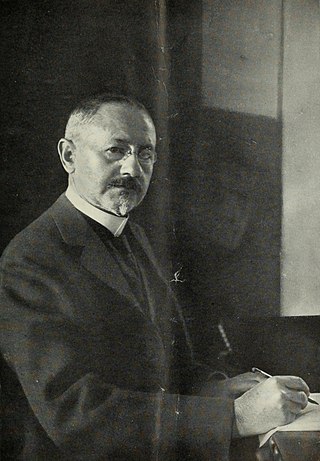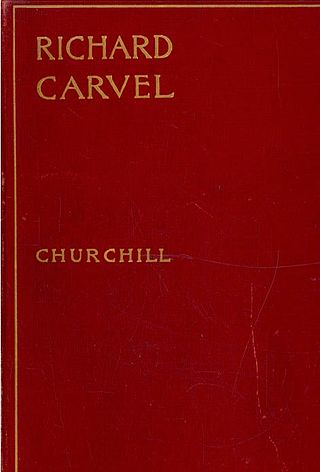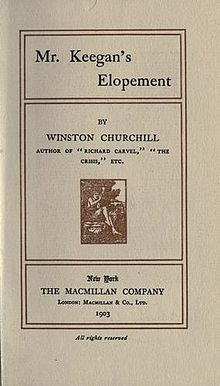
The Battle of Omdurman was fought during the Anglo-Egyptian conquest of Sudan between a British–Egyptian expeditionary force commanded by British Commander-in-Chief (sirdar) major general Horatio Herbert Kitchener and a Sudanese army of the Mahdist State, led by Abdallahi ibn Muhammad, the successor to the self-proclaimed Mahdi, Muhammad Ahmad. The battle took place on 2 September 1898, at Kerreri, 11 kilometres (6.8 mi) north of Omdurman.

Lieutenant-Colonel Charles Richard John Spencer-Churchill, 9th Duke of Marlborough,, styled Earl of Sunderland until 1883 and Marquess of Blandford between 1883 and 1892, was a British soldier and Conservative politician, and a close friend of his first cousin Winston Churchill. He was often known as "Sunny" Marlborough after his courtesy title of Earl of Sunderland.

Lord Randolph Henry Spencer-Churchill was a British aristocrat and politician. Churchill was a Tory radical and coined the term 'Tory democracy'. He participated in the creation of the National Union of the Conservative Party.

Sir John Desmond Patrick Keegan was an English military historian, lecturer, author and journalist. He wrote many published works on the nature of combat between prehistory and the 21st century, covering land, air, maritime, intelligence warfare and the psychology of battle.

Richard Harding Davis was an American journalist and writer of fiction and drama, known foremost as the first American war correspondent to cover the Spanish–American War, the Second Boer War, and World War I. His writing greatly assisted the political career of Theodore Roosevelt. He also played a major role in the evolution of the American magazine. His influence extended to the world of fashion, and he is credited with making the clean-shaven look popular among men at the turn of the 20th century.

Winston Churchill was an American best-selling novelist of the early 20th century.

The River War: An Historical Account of the Reconquest of the Soudan (1899), by Winston Churchill, is a history of the conquest of the Sudan between 1896 and 1899 by Anglo-Egyptian forces led by Lord Kitchener. He defeated the Sudanese Dervish forces, led by Khalifa Abdallahi ibn Muhammad, heir to the self-proclaimed Mahdi Muhammad Ahmad, who had vowed to conquer Egypt and drive out the Ottomans. The first, two-volume, edition includes accounts of Churchill's own experiences as a British Army officer during the war, and his views on its conduct.

Richard George Penn Curzon, 4th Earl Howe,, styled Viscount Curzon between 1876 and 1900, was a British courtier and Conservative politician. He served as Treasurer of the Household between 1896 and 1900 and was Lord Chamberlain to Queen Alexandra.

Henry Algernon George Percy, Earl Percy, sometimes styled as Lord Percy or, until 1899, Lord Warkworth, was a British Conservative politician. He held political office under Arthur Balfour as Under-Secretary of State for India and Under-Secretary of State for Foreign Affairs before his early death in 1909.

A Far Country is a novel by American writer Winston Churchill published in 1915.

Winston Churchill, in addition to his careers as a soldier and politician, was a prolific writer under the variant of his full name 'Winston S. Churchill'. After being commissioned into the 4th Queen's Own Hussars in 1895, Churchill gained permission to observe the Cuban War of Independence, and sent war reports to The Daily Graphic. He continued his war journalism in British India, at the Siege of Malakand, then in the Sudan during the Mahdist War and in southern Africa during the Second Boer War.

George Platt Brett Sr. was a British-born chairman and publisher of the American division of Macmillan Publishing. He was best known for serving as publisher, friend, and mentor of American author Jack London. Under Brett's leadership, Macmillan became one of the largest publishers in America. Sales grew from $50,000 in 1890 and grew to $8.5 million in 1931. In 1931, Macmillan annuals produced between 600 and 700 titles.
The Celebrity (1897) is the first novel that was published by American author Winston Churchill. It was a minor bestseller of 1898.

The Crisis is an historical novel published in 1901 by the American novelist Winston Churchill. It was the best-selling book in the United States in 1901. The novel is set in the years leading up to the first battles of the American Civil War, mostly in the divided state of Missouri. It follows the fortunes of young Stephen Brice, a man with Union and abolitionist sympathies, and his involvement with a Southern family.

Richard Carvel is a historical novel by the American novelist Winston Churchill. It was first published in 1899 and was exceptionally successful, selling around two million copies and making the author a rich man. The novel takes the form of the memoirs of an eighteenth-century gentleman, the Richard Carvel of the title, and runs to eight volumes. It is set partly in Maryland and partly in London, England, during the American revolutionary era

The Crossing is a 1904 best-selling novel by American writer Winston Churchill. It was the best-selling novel in the United States in 1904, and includes illustrations by Sydney Adamson and Lilian Bayliss. A portion of the book first appeared in December 1903 in Collier's under the title The Borderland.
This is a list of bestselling novels in the United States from 1895 through 1899, as determined by The Bookman, a New York–based literary journal. Without the international copyright law which came into force in 1891, these volumes could have been printed and published by anyone, the change in this state of affairs made it possible to compile accurate sales figures.
Barbara Leaming is an American biographer, whose subjects have included Roman Polanski, Orson Welles, Rita Hayworth, Marilyn Monroe, John F. Kennedy, Winston Churchill, and Jacqueline Kennedy Onassis.

Herbert Vivian was an English journalist, author and newspaper owner, who befriended Lord Randolph Churchill, Charles Russell, Leopold Maxse and others in the 1880s. He campaigned for Irish Home Rule and was private secretary to Wilfrid Blunt, poet and writer, who stood in the 1888 Deptford by-election. Vivian's writings caused a rift between Oscar Wilde and James NcNeil Whistler. In the 1890s, Vivian was a leader of the Neo-Jacobite Revival, a monarchist movement keen to restore a Stuart to the British throne and replace the parliamentary system. Before the First World War he was friends with Winston Churchill and was the first journalist to interview him. Vivian lost as Liberal candidate for Deptford in 1906. As an extreme monarchist throughout his life, he became in the 1920s a supporter of fascism. His several books included the novel The Green Bay Tree with William Henry Wilkins. He was a noted Serbophile; his writings on the Balkans remain influential.
















